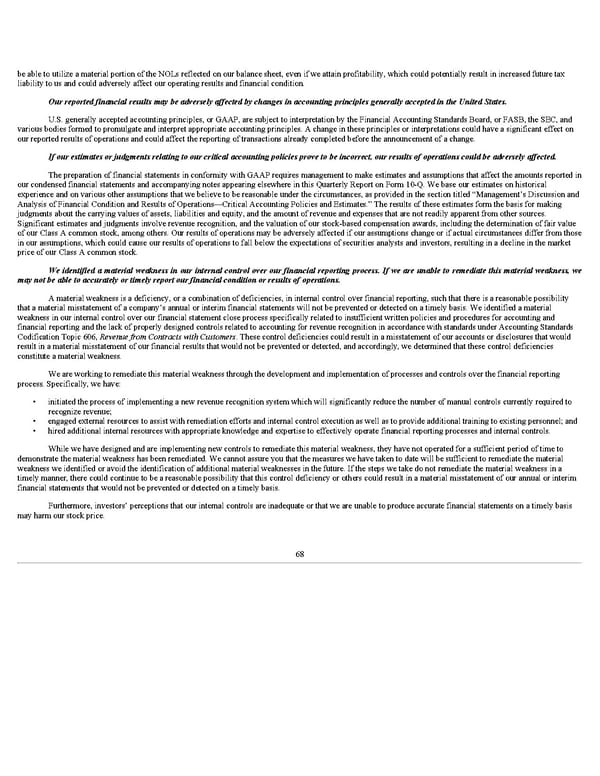be able to utilize a material portion of the NOLs reflected on our balance sheet, even if we attain profitability, which could potentially result in increased future tax liability to us and could adversely affect our operating results and financial condition. Our reported financial results may be adversely affected by changes in accounting principles generally accepted in the United States. U.S. generally accepted accounting principles, or GAAP, are subject to interpretation by the Financial Accounting Standards Board, or FASB, the SEC, and various bodies formed to promulgate and interpret appropriate accounting principles. A change in these principles or interpretations could have a significant effect on our reported results of operations and could affect the reporting of transactions already completed before the announcement of a change. If our estimates or judgments relating to our critical accounting policies prove to be incorrect, our results of operations could be adversely affected. The preparation of financial statements in conformity with GAAP requires management to make estimates and assumptions that affect the amounts reported in our condensed financial statements and accompanying notes appearing elsewhere in this Quarterly Report on Form 10-Q. We base our estimates on historical experience and on various other assumptions that we believe to be reasonable under the circumstances, as provided in the section titled “Management’s Discussion and Analysis of Financial Condition and Results of Operations—Critical Accounting Policies and Estimates.” The results of these estimates form the basis for making judgments about the carrying values of assets, liabilities and equity, and the amount of revenue and expenses that are not readily apparent from other sources. Significant estimates and judgments involve revenue recognition, and the valuation of our stock-based compensation awards, including the determination of fair value of our Class A common stock, among others. Our results of operations may be adversely affected if our assumptions change or if actual circumstances differ from those in our assumptions, which could cause our results of operations to fall below the expectations of securities analysts and investors, resulting in a decline in the market price of our Class A common stock. We identified a material weakness in our internal control over our financial reporting process. If we are unable to remediate this material weakness, we may not be able to accurately or timely report our financial condition or results of operations. A material weakness is a deficiency, or a combination of deficiencies, in internal control over financial reporting, such that there is a reasonable possibility that a material misstatement of a company’s annual or interim financial statements will not be prevented or detected on a timely basis. We identified a material weakness in our internal control over our financial statement close process specifically related to insufficient written policies and procedures for accounting and financial reporting and the lack of properly designed controls related to accounting for revenue recognition in accordance with standards under Accounting Standards Codification Topic 606, Revenue from Contracts with Customers . These control deficiencies could result in a misstatement of our accounts or disclosures that would result in a material misstatement of our financial results that would not be prevented or detected, and accordingly, we determined that these control deficiencies constitute a material weakness. We are working to remediate this material weakness through the development and implementation of processes and controls over the financial reporting process. Specifically, we have: • initiated the process of implementing a new revenue recognition system which will significantly reduce the number of manual controls currently required to recognize revenue; • engaged external resources to assist with remediation efforts and internal control execution as well as to provide additional training to existing personnel; and • hired additional internal resources with appropriate knowledge and expertise to effectively operate financial reporting processes and internal controls. While we have designed and are implementing new controls to remediate this material weakness, they have not operated for a sufficient period of time to demonstrate the material weakness has been remediated. We cannot assure you that the measures we have taken to date will be sufficient to remediate the material weakness we identified or avoid the identification of additional material weaknesses in the future. If the steps we take do not remediate the material weakness in a timely manner, there could continue to be a reasonable possibility that this control deficiency or others could result in a material misstatement of our annual or interim financial statements that would not be prevented or detected on a timely basis. Furthermore, investors’ perceptions that our internal controls are inadequate or that we are unable to produce accurate financial statements on a timely basis may harm our stock price. 68
 Q3 2021 10Q Page 73 Page 75
Q3 2021 10Q Page 73 Page 75